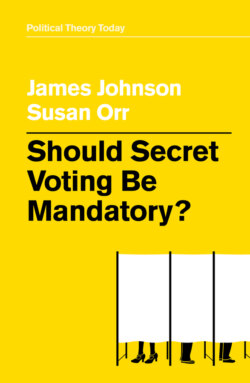Should Secret Voting Be Mandatory?

Реклама. ООО «ЛитРес», ИНН: 7719571260.
Оглавление
James Johnson. Should Secret Voting Be Mandatory?
Contents
Guide
Pages
Series title. Political Theory Today series
Should Secret Voting Be Mandatory?
Copyright page
Dedication
Introduction
Notes
1 The Clash of Inclusion and Integrity?
Ideals and institutions
Institutions
Ideals
Secret voting among political theorists: advocates
Secret voting among political theorists: critics
The strategic structure of the secret ballot
The normative terrain
The limits of the secret ballot
Notes
2 A Precarious Institution Under Siege
Elections before secret voting
The rise of the “Australian ballot”
Consequences and limits of the Australian ballot
Back to the future and beyond
Notes
3 Non-Domination in Elections Requires Mandatory Voting Too
Two clarifications
The standard case for mandatory voting – and ours
Inclusion goes awry – the varieties, extent, and consequences of convenience voting
The normative terrain
Conclusion
Notes
References
POLITY END USER LICENSE AGREEMENT
Отрывок из книги
James Johnson
Susan Orr
.....
Our proposal resists fatalism yet aims to infuse some realism into proposals for increasing participation. Flatly, we oppose widespread adoption of policies that make voting more convenient. Why? First, there is little evidence that such initiatives expand participation in inclusive ways. But, more importantly, such measures threaten electoral integrity. It is not difficult to fathom how they might do so. They undermine ballot secrecy that was introduced to foreclose intimidation and bribery of voters – practices which are starting to reemerge. Consider vote-by-mail schemes. In recent elections in the United States and United Kingdom, for instance, between a fifth and a quarter of all votes were cast by mail. Imagine that your employer offers to witness your ballot and then mail it on your behalf. Or perhaps your landlord generously sends someone to collect your ballot along with your rent and requests you leave the former inside the unsealed envelope containing the latter. Perhaps you are an immigrant with limited language skills and a political party sends an operative to your door to help you complete your ballot. Or consider the partner or children of an abuser who demands the family sit together at the kitchen table to complete their ballots. These scenarios are hardly fanciful and we provide examples of such behavior in the text. Here the point simply is that the ways in which convenience-voting initiatives promise to encourage participation operate at odds with both inclusion and integrity.
If we hope to reinvigorate democratic politics, we should not make voting “convenient”; we should make it mandatory. Advocates of what commonly is called compulsory voting often endorse it as a way to increase participation that, since it requires all voters to go to the polls, also is inclusive. Such arguments are important. However, we focus our argument elsewhere. We support making voting mandatory because, in tandem with the secret ballot, it promotes electoral integrity. We argue that this can help offset declining confidence in democratic politics by dramatically expanding democratic participation in ways that recognize the intimate connections between inclusion and integrity in electoral politics. Simply put, we argue that voting must be both secret and mandatory.
.....